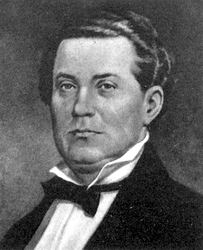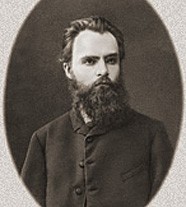
Semyon Stepanovich Gulak-Artemovsky |
Semen Hulak-Artemovsky
Songs for Little Russia – everything; and poetry, and history, and the father’s grave … All of them are harmonious, fragrant, extremely diverse. N. Gogol
On the fertile ground of Ukrainian folk music, the talent of the famous composer and singer S. Gulak-Artemovsky flourished. Born into the family of a village priest, Gulak-Artemovsky was supposed to follow in his father’s footsteps, but this family tradition was broken by the boy’s all-consuming craving for music. Entering the Kiev Theological School in 1824, Semyon began to study successfully, but very soon he got bored with theological subjects, and the following entry appeared in the student’s certificate: “good abilities, lazy and lazy, small successes.” The answer is simple: the future musician devoted all his attention and time to singing in the choir, almost never appearing at classes at the school, and later at the seminary. The sonorous treble of the little chanter was noticed by a connoisseur of choral singing, an expert on Russian singing culture, Metropolitan Evgeny (Bolkhovitikov). And now Semyon is already in the metropolitan choir of St. Sophia Cathedral in Kyiv, then – in the choir of the Mikhailovsky Monastery. Here the young man in practice comprehended the centuries-old tradition of choral music.
In 1838, M. Glinka heard the singing of Gulak-Artemovsky, and this meeting decisively changed the fate of the young singer: he followed Glinka to St. Petersburg, from now on devoting himself entirely to music. Under the guidance of an older friend and mentor, Gulak-Artemovsky, in a short time, he went through a school of comprehensive musical development and vocal training. His progressive artistic convictions were strengthened in creative communication with Glinka’s circle of friends – the artist K. Bryullov, the writer N. Kukolnik, the musicians G. Lomakin, O. Petrov and A. Petrova-Vorobyeva. At the same time, an acquaintance with the outstanding Ukrainian poet-revolutionary T. Shevchenko took place, which turned into true friendship. Under the guidance of Glinka, the future composer persistently comprehended the secrets of vocal mastery and the laws of musical logic. The opera “Ruslan and Lyudmila” at that time owned the thoughts of Glinka, who wrote about classes with Gulak-Artemovsky: “I am preparing him to be a theater singer and I hope that my labors will not be in vain …” Glinka saw in the young musician the performer of the part of Ruslan. In order to develop stage restraint and overcome the shortcomings of the manner of singing, Gulak-Artemovsky, at the insistence of an older friend, often performed in various musical evenings. A contemporary described his singing as follows: “The voice was fresh and huge; but he uttered not the slightest manner and word desperately … It was annoying, I wanted to admire, but laughter penetrated.
However, careful, persistent study under the guidance of a brilliant teacher brought brilliant results: the first public concert of Gulak-Artemovsky was already a great success. The vocal and composing talent of the young musician flourished thanks to a long trip to Paris and Italy, undertaken through the efforts of Glinka with the financial support of the philanthropist P. Demidov in 1839-41. Successful performances on the opera stage in Florence opened the way for Gulak-Artemovsky to the imperial stage in St. Petersburg. From May 1842 to November 1865 the singer was permanently a member of the opera troupe. He performed not only in St. Petersburg, but also in Moscow (1846-50, 1864-65), he also toured in provincial cities – Tula, Kharkov, Kursk, Voronezh. Among the numerous roles of Gulak-Artemovsky in the operas by V. Bellini, G. Donizetti, K. M. Weber, G. Verdi and others, the magnificent performance of the role of Ruslan stands out. Hearing the opera “Ruslan and Lyudmila”, Shevchenko wrote: “What an opera! Especially when Artemovsky sings Ruslan, you even scratch the back of your head, it’s true! A wonderful singer – you will not say anything. Due to the loss of his voice, Gulak-Artemovsky left the stage in 1865 and spent his last years in Moscow, where his life was very modest and solitary.
A subtle sense of theatricality and fidelity to the native musical element – Ukrainian folklore – are characteristic of Gulak-Artemovsky’s compositions. Most of them are directly related to the theatrical and concert activities of the author. This is how romances, adaptations of Ukrainian songs and original songs in the folk spirit appeared, as well as major musical and stage works – the vocal and choreographic divertissement “Ukrainian Wedding” (1852), music for his own comedy-vaudeville “The Night on the Eve of Midsummer Day” (1852), music for the drama The Destroyers of Ships (1853). The most significant creation of Gulak-Artemovsky – a comic opera with colloquial dialogues “The Cossack beyond the Danube” (1863) – happily combines good-natured folk humor and heroic-patriotic motifs. The performance revealed different facets of the author’s talent, who wrote both the libretto and music, and also played the title role. Petersburg critics noted the success of the premiere: “Mr. Artemovsky showed his brilliant comedic talent. His game was full of comedy: in the face of Karas, he displayed the right type of Cossack. The composer managed to convey the generous melody and incendiary dance motor skills of Ukrainian music so vividly that sometimes his melodies are indistinguishable from folk ones. Therefore, they are popular in Ukraine along with folklore. Astute listeners sensed the true nationality of the opera already at the premiere. The reviewer of the newspaper “Son of the Fatherland” wrote: “The main merit of Mr. Artemovsky is that he laid the foundation for the comic opera, proving how well it could take root in our country, and especially in the folk spirit; he was the first to introduce a comic element native to us on our stage … and I am sure that with each performance her success will grow.
Indeed, Hulak-Artemovsky’s compositions still retain their significance not only as the first Ukrainian opera, but also as a lively, scenically attractive work.
N. Zabolotnaya





